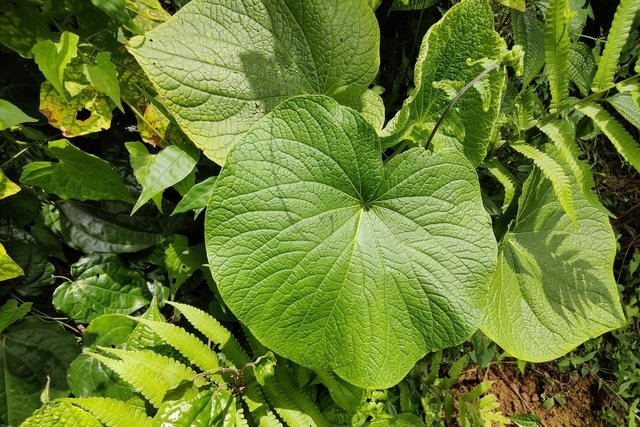Pariparoba is a medicinal plant, of the species Pepper covered It is widely used to help treat liver disease, heartburn, poor digestion or stomach pain, but also to alleviate the symptoms of colds and flu.
The normally used parts of pariparoba, also known as capeba, are the leaves or roots from which active substances with medicinal properties are extracted, for the preparation of tea, infusion, poultice, capsules or tincture.
Pariparoba can be found in health food stores or compounding pharmacies, and should be used under medical advice or from a herbalist.

What is it for
Pariparoba is indicated to help in the treatment of:
- Liver or gallbladder diseases;
- Heartburn, poor digestion, stomach pain or peptic ulcer;
- Flu or colds;
- Sore throat, toothache or fever;
- Diseases of the kidneys or spleen;
- Urinary infection;
- Bronchitis;
- Boils or burns on the skin;
- Hemorrhoids.
Furthermore, pariparoba can also be used to help reduce leg swelling or high blood pressure due to its diuretic effects, and protect the skin from damage caused by the sun’s UV rays, due to its photoprotective and antioxidant action.
The benefits of pariparoba are due to the substances in its composition, such as flavonoids, phytosteroids, phenolic compounds and essential oil, which give it anti-inflammatory, antioxidant, healing, antiulcer, febrifuge, laxative and sweating properties.
Although it has many benefits, pariparoba does not replace medical treatment and should be used under the guidance of a doctor or herbalist.
How to use
Pariparoba can be used in the form of tea, infusion, poultice, capsules or tincture, prepared with the leaves, roots or bark.
1. Pariparoba tea
Pariparoba tea must be prepared with the leaves of this medicinal plant and can be used to help alleviate liver, spleen or pancreas diseases, heartburn, poor digestion, stomach pain or urinary infections, for example.
Ingredients
- 1 teaspoon of chopped pariparoba roots;
- 1 cup of boiling water.
Preparation mode
Add the pariparoba roots and water to a container and heat until it boils. Then turn off the heat, cover and let it rest for about 5 to 10 minutes. Then strain, wait for it to cool and drink 1 cup up to 3 times a day.
2. Pariparoba infusion
The pariparoba infusion must be made with the leaves of this plant and can be used to help relieve fever, flu, colds or bronchitis.
Ingredients
- 1 tablespoon of pariparoba leaves and stems;
- 1 cup (tea) of water.
Preparation mode
Bring the water to a boil and, as soon as the first bubbles are forming, turn off the heat. Pour boiling water over the chopped pariparoba leaves and stems, simmer and let rest for 5 to 10 minutes. Then strain, wait for it to warm and drink 1 cup 1 to 3 times a day.
3. Pariparoba poultice
Pariparoba poultice, prepared with its leaves, can be used to help treat skin problems, due to its anti-inflammatory and healing properties.
Ingredients
- 4 pariparoba leaves;
- 500 mL of boiling water.
Preparation mode
Add the pariparoba leaves to the boiling water, cover and let it rest for about 15 minutes. Then remove the pariparoba leaves and apply to the affected area of the skin.
4. Tincture of pariparoba
Pariparoba tincture can be purchased at compounding pharmacies or health food stores and can be used for liver problems.
Ingredients
- 20 drops of pariparoba tincture;
- 1 glass of filtered water.
Preparation mode
Dilute the drops of pariparoba tincture in water and drink up to 2 times a day.
The duration of treatment with pariparoba tincture depends on medical guidance and indication.
5. Pariparoba capsules
Pariparoba capsules must be taken orally, with a dose of 1 capsule of 300 mg being normally recommended, 1 to 2 times a day.
Pariparoba capsules should always be used with medical or herbalist guidance, according to the condition to be treated, with individualized doses.
Possible side effects
The most common side effects of pariparoba are nausea, vomiting, diarrhea, cramps, fever, headache, skin allergies or tremors.
Who shouldn’t use
Pariparoba should not be used by children or pregnant or breastfeeding women.
Furthermore, pariparoba tincture, as it contains alcohol, should not be used by people being treated for alcoholism or who use the medicine disulfiram.
It is important to emphasize that the use of pariparoba should only be done with the advice of a doctor or herbalist.

Sign up for our newsletter and stay up to date with exclusive news
that can transform your routine!
Warning: Undefined array key "title" in /home/storelat/public_html/wp-content/plugins/link-whisper-premium/templates/frontend/related-posts.php on line 12
Warning: Undefined array key "title_tag" in /home/storelat/public_html/wp-content/plugins/link-whisper-premium/templates/frontend/related-posts.php on line 13



